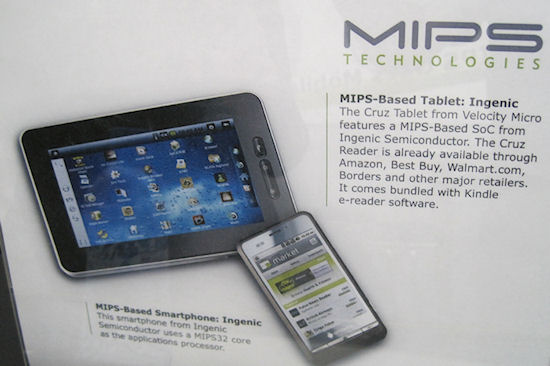Alternative vote
As ARM told us at the show, things are looking pretty good for the UK low-power chip designer. Not only is it reflecting on a record year on the back of the mobile device boom, it has its sights set on mobile computing as a whole.
But ARM would be well advised not to be too distracted by taking on Intel in its home territory, as another rival reckons it has a better low-power proposition, and the rise of Android has given it the entry into the mobile market it needs.
We spoke to Manuel Uhm, marketing director of mobile at MIPS, at Mobile World Congress and he wasted little time in reasserting the MIPS mobile position. "From a square millimetre perspective, we absolutely kill ARM," he said. Seems clear enough, but just in case, he added: "we're far superior to our competitor."
The basic claim of MIPS is that its architecture is fundamentally more efficient than ARM's. This means that you get similar performance to an ARM-based chip from a smaller and lower-power MIPS-based equivalent, so the company claims. This is due to the architecture being simpler.
MIPS already has a strong position in the baseband processor market, having recently announced a win with Altair, and Uhm told us it's the leader in Wi-Fi router chips. But when ARM was securing its ubiquity in mobile phones, MIPS had its eye on other markets. The company is going through a period of transition now, with the mobile device market very much the target.
It has one company to thank for opening the door to mobile: Google. Android is essentially architecture agnostic, which is why it has already been ported to x86 and why it can also run on MIPS. This fact gives MIPS the opportunity to compete in the mobile space. "People are yearning for an alternative to ARM," said Uhm.
MIPS had brought over a bunch of mobile devices already running on MIPS chips, but Spanish customs had held up most of them for some reason, much to Uhm's annoyance. But we got a shot of this info card detailing a tablet and a smartphone running a MIPS-based SoC made by Ingenic Semiconductor, which you can see below.
We don't have the technical expertise to assess MIPS claims of superiority to ARM. But assuming they're reasonably accurate it seems to have a strong case. Its main challenge is overcoming the massive inertia held by ARM in the mobile device space, but with end-users becoming accustomed to 12-18 hour battery life from their mobile devices, the demand for a more efficient architecture may not be as great as MIPS hopes.















